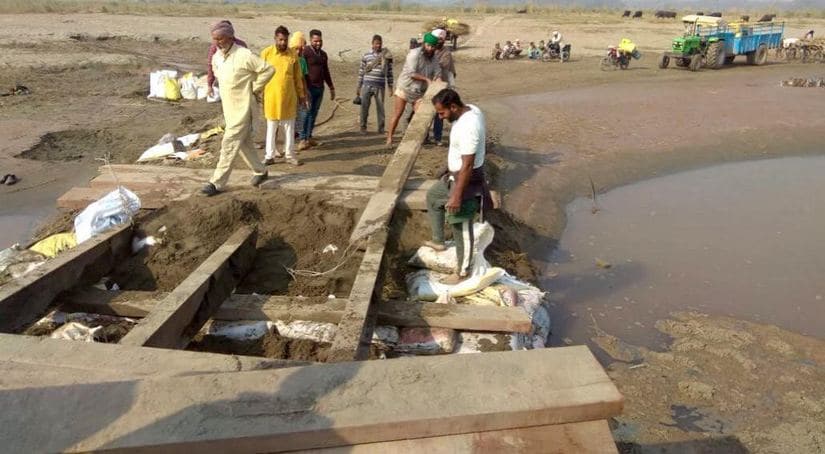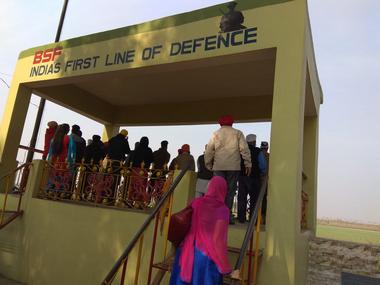Editor’s Note: With India and Pakistan agreeing to build a corridor connecting the holy Sikh shrine of Gurdwara Darbar Sahib in Kartarpur in Pakistan’s Punjab province with Dera Baba Nakak in India’s Punjab, multi-faceted issues have cropped up in the region around the International Border. With the Punjab chief minister sounding an alert that the corridor is ISI’s conspiracy to destabilise Punjab, security concerns have heightened. In a three-part series from the ground on the Indian side, we examine the fear among local residents about the corridor being used to smuggle drugs and as an entry point for Pakistan-trained militants, and also assess the eagerness among some who await to capitalise on the growth in the real estate and tourism sectors that this corridor promises.
***
Dera Baba Nanak (Gurdaspur): Wearing a blue turban, Narjinder Singh peers through the binoculars installed at a small post erected by the Border Security Force at some height. However, a blanket of thick fog obstructs his view of the holiest places in Sikhism. “The view becomes crystal clear in March when the fog subsides and the domes of the shrine can be seen,” he says. “Four kilometers becomes too long a distance for those of us who wish to visit Gurdwara Darbar Sahib in Kartarpur, Pakistan — the place where Guru Nanak Dev, our first guru, spent the last years of his life,” says the 24-year-old resident of Dera Baba Nanak, the last village on the Indian side of International Border in Punjab’s Gurdaspur district. The area has been in news ever since India and Pakistan announced the historic decision to build a visa-free corridor connecting Kartarpur to Dera Baba Nanak in India to allow easier access to Sikh pilgrims who wish to visit Gurdwara Darbar Sahib — one of the holiest places for Sikhs. In November, India and Pakistan laid the foundation stones for the corridor on their sides of the border and promised to ensure that it is operational by 2019 — before the 550th birth anniversary of Guru Nanak Dev — to facilitate easier access for Sikh pilgrims who face delays in getting visas and travel for several hours to cover a distance of only 4 kilometres. At Dera Baba Nanak, it is common to see a queue of people from across the country, awaiting their turn to see the shrine in Pakistan through binoculars. [caption id=“attachment_5724941” align=“alignnone” width=“825”] Najinder Singh says the four-kilometre distance from Gurdaspur in Punjab to Gurdwara Darbar Sahib in Kartarpur was too long. Image Courtesy: Arjun Sharma/101Reporters[/caption] Sidhu’s hug did the magic? Located in a maze of lanes, the Dera Baba Nanak Municipal Council had population of 6,394, according to the 2011 Census, of which 3,063 (47.9 percent) were female. Most of the villagers have farmlands where they grow sugarcane, wheat and paddy. While 55.51 percent of the population in Dera Baba Nanak is Hindu, Sikhs constitute 41.09 percent of the lot. The local residents here do not have “hatred” towards Pakistan and rather wish that relations between the two countries improve. Actor-politician Vinod Khanna of the Bharatiya Janata Party (BJP) represented the Gurdaspur parliamentary constituency till he passed away in 2017. In the Lok Sabha bypoll that followed, Punjab Congress president Sunil Jakhar won the seat. Local residents say it was state cabinet minister Navjot Singh Sidhu’s hug with Pakistan Chief of Army Staff Qamar Javed Bajwa that made the revival of the corridor possible and made the town so popular that people from far off places have started visiting the area. They believe that the hug brought their town in national and international focus, thus opening doors for prosperity in future if the Kartarpur Corridor opens as per schedule. However, Chief Minister of Punjab Amarinder Singh had said on Sunday that the Pakistan Army chief had told Sidhu about the opening of the Kartarpur Corridor even before Imran Khan was sworn in as prime minister. Amarinder claimed that the corridor was nothing but a conspiracy by the Pakistan Army to destabilise India’s Punjab. He also maintained that he had advised Sidhu against visiting Pakistan for the ground-breaking ceremony of the corridor on 28 November, but the cabinet minister had gone anyway because of his personal friendship with Imran. Other concerns: Terrorism, drug peddling While the opening of the Kartarpur Corridor is a dream come true for most people of Punjab, some are sceptical about the development because of the terror attacks in the area and the existing drug problem. Satnam Singh, a 64-year-old resident of Ghanike Bet village in Dera Baba Nanak tehsil, says that though the corridor was a long-pending demand of Sikhs, it should function without “importing” any disturbances in the region, and there should be proper checks to ensure that the corridor is not misused. “Even after 1947, people used to cross over to the other side (to Kartarpur) without permission. But with the passage of time and strained relations with Pakistan, our people were not allowed to visit the shrine without a valid visa. A small distance became too big for us. And barbed fences between two nations made it impossible to visit the shrine from Dera Baba Nanak,” he explains. The fears over security in the region are not unfounded. In 2015, Dinanagar Police Station in Gurdaspur district was attacked
allegedly by Pakistani extremists, leading to 11 causalities, including three terrorists. The very next year, a group of armed infiltrators, allegedly from across the border, had attacked the Pathankot airbase in the neighbouring district, killing two security personnel. Four terrorists were gunned down by Indian forces. These incidents scarred the minds of the villagers who are now worried about the security threats that may arise because of the Kartarpur Corridor. However, very few in the area register it vocally due to fear. [caption id=“attachment_5724951” align=“alignnone” width=“825”]
The BSF post in Gurdaspur from where the Kartarpur shrine in Pakistan can be seen through binoculars. Image Courtesy: Arjun Sharma/101Reporters[/caption] ‘Police jobs to locals would help security’ Apprehensions over the corridor are not limited to the terror threat. According to the proposed plan for the corridor, authorities plan to build two bridges to complete the route — one over River Ravi in India and the other over a stream that runs parallel to the river in Pakistan. United Sikh Mission, an NGO with members in India, Pakistan and Canada, among other countries, had submitted a detailed report on the route to the governments of India and Pakistan. Also, this route was the direct connection between two towns on both sides before 1947. This is because Ravi meanders in a zigzag pattern into India and Pakistan in many villages along the border. While the Indian territory needs to work on a 1-kilometre stretch for the corridor, Pakistan has to build a route nearly 3 kilometrs long on its side. The distance from the Indian side to the border is 1 kilometre. However, people from nearby villages are distrustful of the lofty promises. Basant Singh, a 68-year-old resident of Dharamkot-Pattan village who has to cross Ravi in the Indian territory every day to look after his crops, questions how the government can “connect two areas in two different countries” when they have not been able to construct a permanent bridge over the river for decades now. Basant insists that the government should ensure that the work on the route starts soon since the announcement of the Kartarpur Corridor has raised the hopes of the Sikh community. “Villages in the areas through which the corridor will be built will also expect security arrangements to be strengthened,” he says, adding that the government should provide more employment to the local youth in the police department and “deploy them here only”. The Border Security Force and the Indian Army guards the border area in this region. The Army is also building a permanent bridge to cross the river and officials present on the site said the bridge would be used by locals to cross the river throughout the year. However, they refused to divulge further details. [caption id=“attachment_5724961” align=“alignnone” width=“825”]
 The temporary bridge built over River Ravi that is being repaired. Image Courtesy: Arjun Sharma/101Reporters[/caption] Radicalisation of youth Another looming concern for people residing in and around Dera Baba Nanak is the alleged radicalisation of Sikh youth propagated by Pakistan. Many in the region have heard rumours that Pakistan could propagate separatist ideology at the shrine when Sikhs from India’s Punjab visit it through the corridor. A group of pilgrims who visited the shrine recently on the birth anniversary of Guru Nanak Dev was allegedly shown posters of separatist leader Jarnail Singh Bhindranwale. India’s Ministry of External Affairs had
expressed its protest over the “hostile propaganda”. Furthermore, pro-Khalistan leader Gopal Singh Chawla was present at the ground-breaking ceremony of the corridor in Kartarpur. He was seen shaking hands with the Pakistan Army chief. Gurdev Singh, a 67-year-old farmer who is waiting for the floating bridge to be repaired so he can visit his land on the other side of Ravi, says that the smuggling of drugs from across the border has become rampant in recent years. “At present, there is border fencing, but they (Pakistan) are still sending drugs into India. What if they misuse the corridor when it is opened,” he asks. A
report by the Red Cross Drug De-Addiction Treatment-cum-Rehabilitation Centre says that growing drug addiction is assuming alarming proportions in Gurdaspur district, which shares a border with Himachal Pradesh and Jammu and Kashmir. Its 96-kilometre boundary with Pakistan serves as a gateway to these two states. “The geographic location of the district makes the area an important and the only passage for all drugs such as opium, smack, heroin, etc, from every direction across the international as well as inter-state borders,” the report claims. Also Read:
Connecting Kartarpur: Real estate prices go north in town bordering Sikh shrine, hoteliers expect tourism boom The author is a freelance writer and a member of
101Reporters.com
The temporary bridge built over River Ravi that is being repaired. Image Courtesy: Arjun Sharma/101Reporters[/caption] Radicalisation of youth Another looming concern for people residing in and around Dera Baba Nanak is the alleged radicalisation of Sikh youth propagated by Pakistan. Many in the region have heard rumours that Pakistan could propagate separatist ideology at the shrine when Sikhs from India’s Punjab visit it through the corridor. A group of pilgrims who visited the shrine recently on the birth anniversary of Guru Nanak Dev was allegedly shown posters of separatist leader Jarnail Singh Bhindranwale. India’s Ministry of External Affairs had
expressed its protest over the “hostile propaganda”. Furthermore, pro-Khalistan leader Gopal Singh Chawla was present at the ground-breaking ceremony of the corridor in Kartarpur. He was seen shaking hands with the Pakistan Army chief. Gurdev Singh, a 67-year-old farmer who is waiting for the floating bridge to be repaired so he can visit his land on the other side of Ravi, says that the smuggling of drugs from across the border has become rampant in recent years. “At present, there is border fencing, but they (Pakistan) are still sending drugs into India. What if they misuse the corridor when it is opened,” he asks. A
report by the Red Cross Drug De-Addiction Treatment-cum-Rehabilitation Centre says that growing drug addiction is assuming alarming proportions in Gurdaspur district, which shares a border with Himachal Pradesh and Jammu and Kashmir. Its 96-kilometre boundary with Pakistan serves as a gateway to these two states. “The geographic location of the district makes the area an important and the only passage for all drugs such as opium, smack, heroin, etc, from every direction across the international as well as inter-state borders,” the report claims. Also Read:
Connecting Kartarpur: Real estate prices go north in town bordering Sikh shrine, hoteliers expect tourism boom The author is a freelance writer and a member of
101Reporters.com


)

)
)
)
)
)
)
)
)



